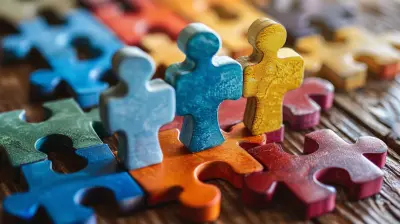The Journey of Grief: Finding Emotional Healing After Loss
16 August 2025
Grief. It’s a word that carries weight we all feel but never truly understand until it hits home. Whether it's the death of a loved one, a breakup, the loss of a job, or even losing a piece of your identity—grief is that silent, invisible storm that sneaks up and knocks the wind out of you.
And here's the truth: it doesn’t follow a neat schedule. There’s no checklist to cross off. No finish line to cross. It just is. But even in its heaviness, grief offers something strange and unexpected… a journey. One that winds and bends, sometimes pulls you under, but ultimately leads to emotional healing—if you're willing to walk through it.
Let’s talk about that journey, shall we?

What Exactly Is Grief?
Grief is our emotional reaction to loss. Simple, right? Not really.It can show up as sadness, anger, guilt, numbness, anxiety—or all of the above, all at once. It’s messy. Human emotions usually are. Grief doesn’t just affect your heart; it takes your mind, body, and spirit along for the rollercoaster ride.
You might cry uncontrollably one minute and feel completely numb the next. You may find yourself laughing at a memory, only to be struck down by sorrow seconds later. That’s normal. That’s grief doing its thing.

The Myth of "Moving On"
Let’s clear something up right away: you don’t "get over" grief. You don’t move on like it’s some old sweater you can throw in the donation bin.Instead, we move forward. We carry the memory. We learn to live alongside the pain. It softens, yes—but it doesn’t disappear like magic. Think of it like learning to walk with a limp: you still move, but differently than before.

The Classic Five Stages—and Why They Don’t Tell the Whole Story
You’ve probably heard of the five stages of grief: denial, anger, bargaining, depression, acceptance. While they’re helpful for understanding some of the emotions you may feel, they’re not always experienced in order. And sometimes, you jump back and forth. Or skip a few.Grief isn’t linear—it’s more like a spiral staircase. You might revisit the same stage multiple times, but from a slightly different perspective each time.
Here’s a deeper look:
1. Denial: The Brain’s Short-Term Bandage
At first, denial is your brain’s way of cushioning the blow. It gives you time to adjust to a new reality that feels too massive to accept in one gulp. You might find yourself saying, “This isn’t happening,” or feeling weirdly numb. That’s your brain trying to keep you upright.2. Anger: The Fire Beneath the Hurt
Anger isn’t bad. It’s just pain's louder cousin. You might be mad at the person who left, at yourself, or even at the universe. That’s okay. Let yourself feel it without judging it. It's your heart screaming that it cared deeply.3. Bargaining: The “What If” Loop
This is where we try to make deals with fate. “If only I had done X, maybe Y wouldn’t have happened.” It’s an attempt to rewrite history—to regain control. But let’s be real: life doesn’t work that way. Still, this stage is important. It shows us how deeply we wanted things to be different.4. Depression: The Heavy Blanket
This isn’t just sadness. It’s deep grief that settles into your daily life. You might feel hopeless or like the color has drained from the world. You may not want to get out of bed, and everything feels pointless. This is the stage where many people get stuck—and it’s where support becomes crucial.5. Acceptance: Making Peace, Not Forgetting
Contrary to the name, acceptance isn’t about being “okay” with the loss. It’s about acknowledging reality and finding ways to live within it. You begin to reinvest in life, find new meaning, and carry your love into the future, rather than letting it keep you anchored in the past.
It’s Not Just Emotional—Grief Lives in the Body Too
Here's the thing most people don’t realize: grief doesn’t just mess with your head—it shakes your whole body.You might be exhausted all the time. Or struggle to sleep. Your appetite may vanish or you may binge-eat your feelings. Some people even get sick more often. That’s your nervous system reacting to emotional trauma.
So, treating your physical health is just as important as looking after your emotional well-being. Move your body, eat well, hydrate, rest. Don’t ignore what your body is trying to tell you.
Coping Strategies That Actually Help
Grief can feel all-consuming, but there are ways to gently create space for healing. Here are some tools you can keep in your emotional toolbox:1. Allow Yourself to Feel
This might sound obvious, but it’s often the hardest part. Society teaches us to “be strong” or “keep busy.” But healing happens when we sit with our emotions, even the ugly ones.Cry if you need to. Scream into a pillow. Write in a journal. Whatever helps you acknowledge the pain—do that.
2. Lean on Your Tribe
You’re not meant to do this alone. Talk to friends or family. And if they don’t know how to support you, tell them what you need.Sometimes, people want to help but have no clue how. You don’t have to pretend you’re fine when you’re not. Vulnerability is not weakness—it’s human.
3. Consider Therapy or Support Groups
Grief counselors and therapists can provide a safe space to untangle the mess in your heart. And support groups? They remind you that you’re not the only one walking this path. Shared pain feels a little lighter.4. Create Rituals
Light a candle for the person you lost. Plant a tree. Visit a special place. Rituals give your grief a physical outlet. They help anchor your pain and turn it into something meaningful.5. Find a Creative Outlet
Art, music, writing, painting—creativity can be incredibly healing. It gives your internal chaos a chance to transform into beauty or expression. You don’t need to be a “creative type” to benefit. Just start somewhere.
When Grief Turns Complicated
Sometimes, grief sticks around like thick fog and doesn’t lift. That might be "complicated grief" or prolonged grief disorder. If you feel stuck for months with no improvement—or life feels truly unlivable—it’s time to reach out for professional help.There’s no shame in saying, “I need help carrying this.” In fact, it’s incredibly brave.
The Hidden Gifts of Grief (Yes, Really)
Okay, this might sound wild—but grief teaches us things we’d never learn otherwise.It reminds us how deeply we loved. It shows us who we are in the rawest of moments. It teaches compassion, perspective, and the value of presence. Many people report a renewed sense of purpose, or a stronger connection to others, after walking through grief.
You might not see it now—and that’s okay. Healing doesn’t mean forgetting the loss. It means integrating it into who you are and finding ways to live meaningfully again.
How to Support Someone Else Who's Grieving
If someone close to you is grieving, here’s how to show up:- Just be there. You don’t need magic words. Silence and presence are powerful.
- Avoid clichés. “They’re in a better place” or “Everything happens for a reason” can feel dismissive.
- Offer practical help. Bring food. Run errands. Babysit. Small acts go a long way.
- Keep checking in. Grief doesn’t expire after a few weeks. Continue to show love months or years later.
Moving Forward—Not Moving On
Remember when we talked about not “getting over” grief? That idea is key.Imagine grief as a backpack. At first, it’s overwhelmingly heavy—too much to carry. But over time, your muscles grow. You get stronger. The backpack doesn’t vanish, but it becomes more manageable.
You learn to carry it with grace, even when it still hurts sometimes. You learn to smile again, love again, and live again.
And that, my friend, is healing.
Final Thoughts
Grief is one of the most profound journeys we experience in life. It’s painful, unpredictable, and deeply personal. But it also teaches us the depth of our humanity—and our strength.So if you’re in the middle of it right now, know this: You’re not broken. You’re grieving. And that’s okay.
Take it one breath, one step, one gentle day at a time.
You’re not alone.
all images in this post were generated using AI tools
Category:
Emotional HealingAuthor:

Eliana Burton
Discussion
rate this article
1 comments
Viviana Weber
Grief can feel overwhelming, but remember, it’s a journey unique to each of us. Healing takes time, and it’s okay to seek support.
September 8, 2025 at 2:55 AM

Eliana Burton
Thank you for your insightful comment. I completely agree—grief is a personal journey, and seeking support is essential for healing.


